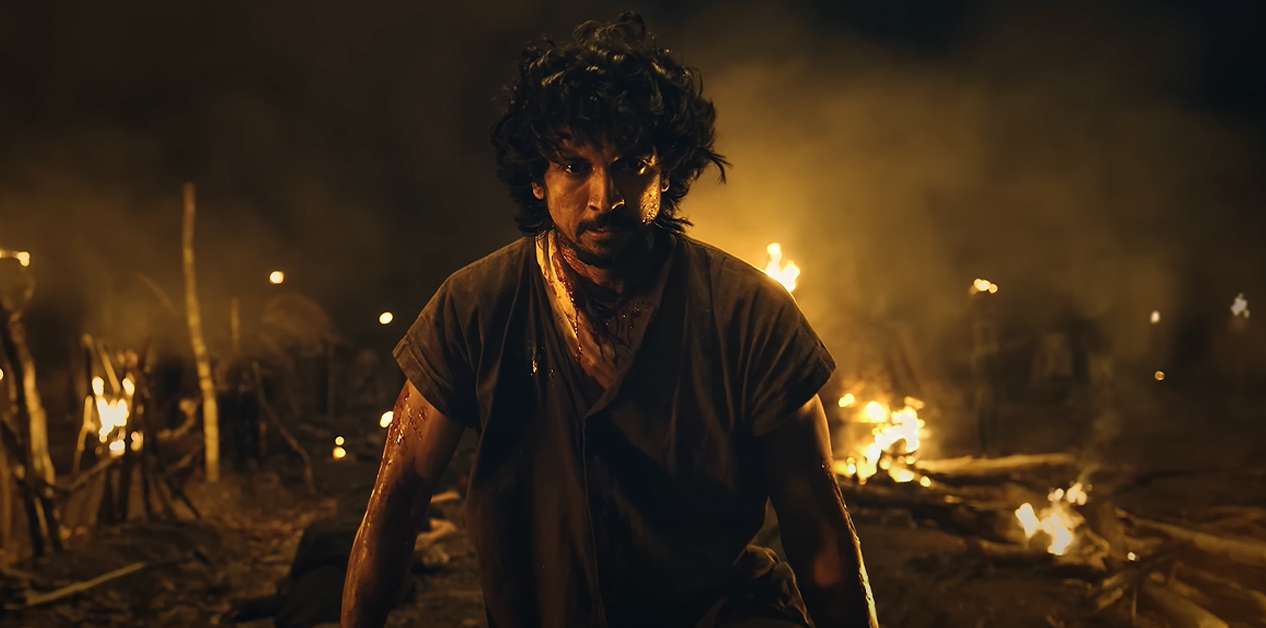

Director: Santosh Sen
Cast: Sameer Bhatt, Richa Sharma, Arpan Thapa, Saugat Malla, Hemant Budhathoki, Kamesh Chaurasia, Kabita Rai, Santosh Sen, and others
Story: Darshan Ji
Producer: Pawan Bradford Bista
Cinematography: Mahesh Paudel
Story/Screenplay: 2/5
The story is set in Villamgadh, a southern border village of Nepal, where violence and chaos are dominated by Bali Sen (Arpan), overshadowing honest politicians like Bijay (Kamesh). However, Bali is merely a tool; the real player is the priest (Hemant).
The priest, who performs human sacrifices, manipulates religion to pursue divisive politics. With ambitions to break up Villamgadh and become its king, he is willing to commit any crime to achieve his goal.
One day, a young man from the village, Abhay (Sameer), who makes a living fishing, witnesses a bomb explosion right before his eyes. Several innocent lives are lost, leaving him shaken.
Subsequently, knowingly or unknowingly, he encounters a group that wreaks havoc in Villamgadh. After discovering that Bali Sen and the priest were responsible for the village explosion and for murdering his father when he was young, Abhay enters the battlefield against his mother’s (Richa) wishes.
Will Abhay be able to stop the power- and authority-filled priest and Bali Sen from breaking up Villamgadh? Will he succeed in taking revenge on his father’s killers? The story revolves around these questions.
The background of conflict in the story is strong, and the powerful action sequences do justice to it. However, when action dominates over plot development and character establishment, the audience occasionally feels “disconnected” from the story and the characters.
The screenplay is quite weak because new scenes are added without coordination, and the audience cannot connect with the characters or events.
Manoj Pandit, known as a “script doctor,” has long advocated for strong conflict in films. According to him, conflict should not only be action-based but also situational and emotional. Yet, in Balidan, where Pandit himself worked as script doctor, the so-called conflict consists almost entirely of action, which is a failure for both the screenwriter and him.
Acting: 2.5/5
Sameer, who emerged as an action hero from 12 Gaun, again shows his capability as an action hero. However, there is still room for improvement in emotional scenes and dialogue delivery.
Richa’s performance as Abhay’s mother is only average. Her character is inconsistently portrayed—sometimes strong, sometimes tearful. Arpan Thapa’s performance as the villain is adequate, though he has played similar roles many times before.
Director Santosh appears in a short but impactful role, fitting well as a tribal villager. However, the entire village ensemble looks mismatched with the post-apocalyptic film characters.
Saugat’s short but impactful role is solid in the action sequences, yet the film would not have suffered if he were absent.
Kabita, who supports Abhay during tough moments, appears occasionally but fails to connect with the audience. Hemanta, as the cruel priest, appears powerful at times and ordinary at others.
Technical Aspects: 3/5
As per the film’s genre, the effort put into the action sequences in Balidan is evident. Even in extended action scenes, the audience is thrilled.
From background music to cinematography, the film adds excitement. The sound design evokes heroism, and the title song Balidan, featuring Sujan Chapagain’s vocals, music, and Harka Saud’s lyrics, complements the theme.
VFX work is commendable. However, scenes outside action sequences reveal editorial weaknesses from the interval onwards.
Direction: 2/5
Santosh Sen is considered skilled in media promotion. Balidan generated significant hype. Yet, he repeatedly fails in direction and production to meet audience expectations. While successful in technical aspects and publicity, Balidan highlights the need for investing in the screenplay.
By attempting to tackle serious political issues such as citizen suffering, ethnic discrimination, and identity politics, the director confines the film to a conventional “revenge film.” Without clearly establishing who sacrifices, why, and for what, the title Balidan seems disconnected from the story.
Hence, it can be said that director Sen’s Balidan is a wasted effort.